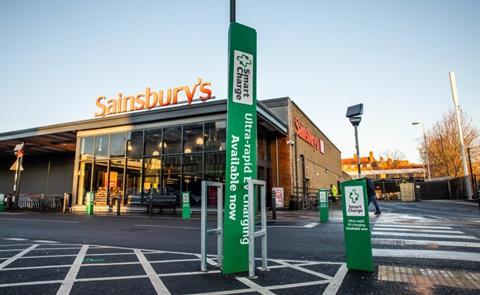
More than one in 10 UK supermarkets offer electric vehicle charging after more than 600 store locations added the equipment in 2023.
That represents a rise of 59% in the total number of supermarkets offering EV chargepoints, from 1,015 in 2022 to 1,616 last year, and equates to 13% of all 12,838 UK multiple-run large stores, including those without parking facilities.
That is according to research from motoring organisation the RAC and Zapmap, an app that allows motorists to locate EV chargepoints.
The number of chargepoints increased by 69% from 1,721 to 2,916 during 2023.
Within this total, 1,107 of the new units were rapid or ultra-rapid. That compares with just 451 of these types of chargers that were installed at supermarkets in 2022.
According to the RAC and Zapmap, it means that more than half – 55% – of all supermarket EV locations now offer higher-powered charging capabilities, and that more than a tenth of all rapid and ultra-rapid chargers in the UK are at supermarkets: 1,107 out of 10,967.
The report says that Sainsbury’s has seen the biggest year-on-year growth in this segment due to the launch of its ultra-rapid network Smart Charge. After installing just 53 units in 2022, the retailer added 104 last year. Sainsbury’s also has the highest number of rapid chargers per location, at four units at each of its stores that provide high-powered charging.
Meanwhile, Tesco has the biggest overall charging network, with 1,305 devices across 4,859 shops – 497 of them added last year. Morrisons comes second in the league, with 413 chargers at 69% of its 497 stores, almost all of which are rapid devices. The report says that will increase significantly following the acquisition of hundreds of Morrisons forecourts by Motor Fuel Group, which has invested heavily in ultra-rapid charging.
The RAC welcomes the increase in higher-powered charging across the UK supermarket network as it argues that concerns about a lack of chargepoints are one of the biggest reasons more drivers are reluctant to acquire electric cars.
“It’s very encouraging to see supermarkets doing their best to allay these fears by ramping up EV charging facilities across a greater proportion of their estates,” says RAC EV spokesperson Simon Williams.
Figures for the survey were sourced from Zapmap’s database of public chargepoints, and the websites of the nine largest UK supermarket chains: Aldi, Asda, Co-op, Lidl, Marks & Spencer, Morrisons, Sainsbury’s, Tesco, and Waitrose.
































